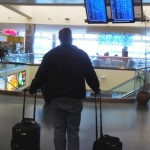Analyst: Fewer Flights From Boise Can’t Be Good For Business
Frontier Airlines recently announced it won’t resume service between Boise and Denver this spring. Early this year, Southwest discontinued its flights from Boise to Seattle, Salt Lake and Reno. An American Airlines affiliate has cancelled its service from Boise to Los Angeles. The net effect is that there will be 20 percent fewer seats leaving Boise this summer than last. What does that mean, as the city and state hustle to attract new businesses? That’s the question I’ve been asking of a lot of people this week. Among them is Adie Tomer, a senior analyst with the Brookings Institution, who focuses on transportation and infrastructure issues.
Q: You have reviewed the recent numbers related to air service in and out of Boise. What do you see?
A: Overall, what I’m seeing in Boise is that passenger numbers are quite a bit down from the economic peak. The passenger numbers are down, and it looks like the effect of that is lost corridors and less service.
Direct service was lost to Atlanta. There weren’t a lot of people taking that flight, but of course if you lose a flight to Atlanta, and you still need to do business there, you have no choice but to fly and you’re forced to use connecting flights.
One other thing: the load factors in and out of Boise have been rising since the recession hit, and also since 2000. What that means is the airlines flying in and out of Boise have adjusted their flights to better account for packing the seats. It means the airlines are probably operating more efficiently for their bottom line.
Q: That’s true across the country, right? Flights are fuller, and the TSA has said we’ll continue to see that trend over the next several years.
A: That’s correct. Flight numbers are down across the country, but the load numbers are higher. The passenger thinks, “I’d much rather have as many flights as possible.” But the flip-side is that if the airlines are not operating efficiently, then they’re more likely to go into bankruptcy court, where the public is going to have to help them.
Q: What I’m interested in is how this loss of flights both reflects and contributes to Boise’s economic situation.
A: It’s a great question. We know through academic research (and, frankly, intuitively) how businesses approach their opportunities for growth. A direct connection and the ability to have face-to-face contact can create strong ties, economically, between places.
Having direct service to Denver and Salt Lake, which have some of the highest connectivity counts across the country, there is an ability to reach a vast number of places, not just domestically but internationally. But there is something to be said for having a direct connection.
The loss of those connections certainly hurts businesses. If nothing else, it takes more time to reach places. One thing we notice, with regards to the recession: economic growth in Boise was hit quite hard. The drop was one of the biggest in the country, in terms of economic growth. It would be expected, as a result of that, to see flights dropping and corridor connections changing.
Q: That makes sense. Flights drop off when the demand for them drops off. I’m also wondering, though, whether it becomes a disincentive for businesses that might consider coming in or expanding operations. How does that affect a metro area?
A: The overall character of the airport is always a significant part of the portfolio for attracting businesses to a location, as well as retaining them. There’s no question that having fewer flights is not a positive for Boise. Now, how much it could adversely affect the metropolitan areas versus others, there’s a lot of other factors that go into play — education characteristics, how many people are moving in, what’s going on with housing prices. A lot of elements are swirling together, but there’s no question that a loss of flights is not going to help the sales pitch when it comes to attracting new businesses.
Q: I’m not wrong, then, in thinking of it as a snowball? In other words, while the loss of flights results from economic dislocation, it also contributes to it?
A: That’s absolutely right. And it goes both ways, too. Recently, we’ve seen positive economic growth in Boise. That can snowball in a positive way, as businesses begin to expand and economic growth returns to the region.
This interview has been edited and shortened.


